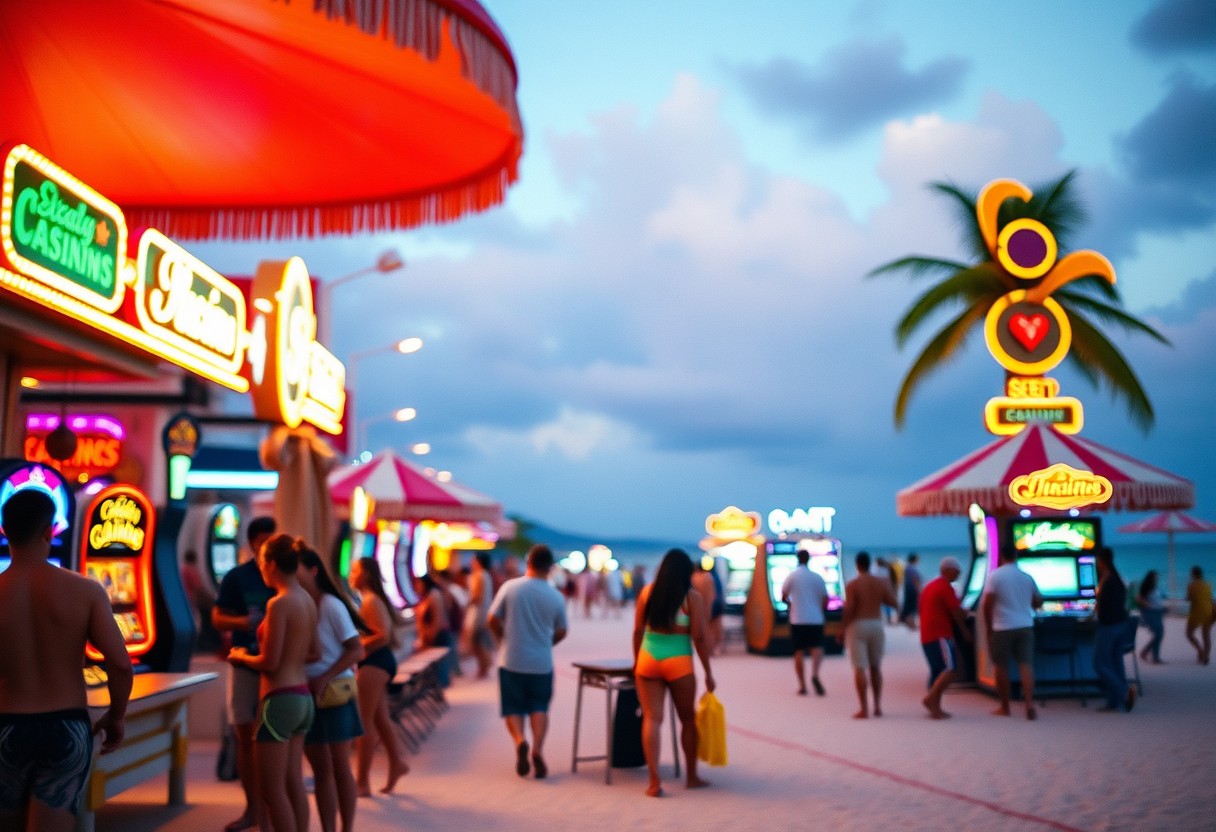Risks of Unregulated Casinos in the Caribbean

There's a growing allure to the Caribbean, often seen as a paradise for sun seekers, but it also serves as a hotspot for unregulated and risky casinos. If you find yourself drawn to the vibrant nightlife and gambling opportunities, it's crucial for you to stay informed about the potential dangers associated with these establishments. This post will outline the challenges and risks that come with gambling in this tropical haven, ensuring that your choices are based on accurate information and awareness of the gaming landscape.
Overview of the Caribbean Casino Landscape
To understand the situation regarding casinos in the Caribbean, it is necessary to examine into the region's unique historical and economic context. The Caribbean has long been a melting pot of cultures, and this diversity has shaped its approach to gambling and casinos. Over the years, various colonial powers and local traditions have influenced the legal and social acceptance of gambling, leading to an evolving landscape that often blurs the lines of regulation.
Historical Context of Gambling in the Caribbean
The introduction of gambling in the Caribbean can be traced back to the colonial era, where it was often tied to local customs and the interests of colonial powers. Over time, this established a complex relationship with gambling that oscillates between acceptance and regulation depending on the prevailing political and social climate.
Growth of Casino Industry in the Region
For many Caribbean nations, the casino industry has become a significant economic driver, attracting millions of tourists each year. With the rise of international travel and tourism in the late 20th and early 21st centuries, governments sought to capitalize on gambling as a way to boost their economies, leading to a rapid expansion of the casino industry.
Gambling has become an integral part of your Caribbean travel experience, with numerous casinos sprouting up across the islands. The proliferation of casinos is a response to the economic necessity of attracting tourists and generating revenue for local governments. As countries vie for tourists' attention, they invest heavily in developing state-of-the-art casinos that offer everything from slot machines to high-stakes poker rooms.
Types of Casinos: Land-based vs. Online
When exploring the Caribbean casino landscape, you will notice two primary types of casinos: land-based and online. Each presents unique advantages and challenges that cater to different types of players.
- Land-based casinos offer the traditional gambling experience, complete with sports betting and luxury amenities.
- Online casinos provide accessibility and convenience, allowing you to gamble from the comfort of your home.
- Many Caribbean countries have embraced both with mixed regulations and oversight.
- Land-based casinos often feature elaborate themes and entertainment options.
- Online platforms continue to grow, offering bonuses and promotions that aren't available in physical locations.
Perceiving the differences between these two types of casinos is necessary for making informed choices about where to gamble.
| Type | Description |
|---|---|
| Land-based Casinos | Physical establishments offering various games and entertainment. |
| Online Casinos | Digital platforms allowing you to play games remotely. |
| Regulation | Land-based establishments are often subject to local laws, while online platforms face mixed regulatory environments. |
| Accessibility | Online casinos provide access 24/7, while land-based requires travel. |
| Social Experience | Land-based casinos allow for social interactions, unlike solitary online play. |
Industry trends indicate a dynamic shift as both types of casinos continue to evolve in response to consumer preferences. As you navigate this landscape, it is crucial to understand the implications of each type of casino on your gambling experience.
Perceiving the ongoing developments in the Caribbean's casino scene will help you make educated choices when participating in gambling activities, ensuring both enjoyment and safety in your experience.
Regulatory Environment
Clearly, the regulatory landscape of the Caribbean is as diverse as its islands. With each nation adopting its own laws and frameworks, you will find significant disparities in how gambling is governed. Some territories have comprehensive regulations in place, while others operate with minimal oversight, leaving players vulnerable to unscrupulous practices. This inconsistency creates hurdles for you as a gambler when deciding where to play safely.
Differences in Regulation Across Caribbean Nations
The lack of a unified regulatory approach across Caribbean nations means that what is legal in one jurisdiction may be entirely unregulated in another. This variability can confuse you, especially if you travel between islands and engage with different casinos. Understanding each country's gaming laws is crucial for ensuring a secure gambling experience.
Challenges of Enforcing Gambling Laws
To enforce gambling laws effectively, Caribbean nations face a multitude of challenges. These include limited resources, political instability, and a lack of technical expertise. Consequently, you may often find that regulations are not enforced uniformly, leading to a situation where questionable practices can thrive unchecked.
Regulatory enforcement is complicated by various factors, such as the intertwined nature of tourism and gambling in the Caribbean. Many governments rely on casino revenues for economic stability, which can lead to reluctance in imposing strict regulations. As a result, you should remain cautious, as operators may use loopholes to exploit players without fear of repercussions.
The Role of Local Governments
Regulation of gambling operations largely falls under the jurisdiction of local governments, which can have a significant impact on the industry's integrity. Your experience as a gambler is directly affected by how well these governments choose to monitor and regulate casino activities. A more vigilant local government can offer you greater assurance, while lax oversight may expose you to unnecessary risks.
A proactive approach from local governments can foster a more secure gaming environment. By establishing clear regulations and enforcement mechanisms, they can protect you from fraudulent operations. However, when local authorities lack the capacity or willingness to act, it can lead to a chaotic landscape where your rights as a consumer may not be upheld. Therefore, understanding the commitment of local governments to regulation can be necessary in making informed gambling choices.
Risks Associated with Unregulated Casinos
Your journey into the world of unregulated casinos in the Caribbean can come with a host of risks, some of which can have lasting consequences. Understanding these risks is crucial for any player considering trying their luck in these establishments.
Financial Risks for Players
Financial risks in unregulated casinos can be significant. Without oversight, these casinos often employ practices that may lead to unfair games or delayed payouts, putting your hard-earned money at great risk.
Potential for Fraud and Scams
One major concern when dealing with unregulated casinos is the potential for fraud and scams. You might find that these establishments can easily manipulate game outcomes, and there is little to no recourse for players when issues arise.
Another critical aspect of the fraud risk is the lack of customer protection. Should you encounter problems, whether it be withdrawal delays or disputes over winnings, you will likely have no legal avenue for recourse. The absence of regulatory bodies means that scammers can operate with relative impunity, leaving you vulnerable to losing not just your money but also your personal information.
Impact on Local Economies
Financially, unregulated casinos can undermine local economies. While they may generate some short-term revenue, the absence of regulation means that profits often don't benefit the community or its infrastructure.
Local businesses and the economy can suffer in the long term as unregulated casinos attract high-stakes gamblers who may not spend money elsewhere. Furthermore, the loss of tax revenue due to these casinos operating outside the legal framework prevents local governments from reinvesting in public services and community development. Thus, while players may enjoy the thrill of gambling, the broader impact could be detrimental to your community's economy.
The Social Implications of Unregulated Gambling
Despite the allure of quick wins and entertainment, unregulated gambling in the Caribbean poses significant social implications that affect both individuals and communities.
Problem Gambling and Addiction
With easy access to casinos and online betting, you may encounter an increased risk of problem gambling and addiction among individuals. These issues can lead to severe financial and psychological distress, impacting not only the gamblers but also their families and social networks.
Effects on Communities and Families
To fully understand the consequences, consider how unregulated gambling can strain relationships, leading to familial breakdown and diminished community cohesion. Losses incurred by gamblers can result in financial hardships that ripple outward, affecting friends and loved ones.
Addiction to gambling can create a cycle of debt and shame, which leads individuals to hide their compulsive behavior from family and friends. As financial troubles mount, the trust between you and your loved ones may erode, often resulting in emotional conflicts and isolation. Communities can also feel the impact through increased crime rates and the loss of local businesses, as residents divert their money to feed their gambling habits rather than invest in their neighborhoods.
Public Health Concerns
Gambling activities can contribute to widespread public health crises, involving mental health issues and substance abuse. You may notice that communities heavily affected by gambling often experience higher rates of depression and anxiety among residents.
This public health concern is exacerbated by the lack of resources for treatment and prevention regarding gambling addiction. Since gambling is frequently downplayed as a mere form of entertainment, many individuals do not receive the help they need until it is too late, leading to a greater burden on healthcare systems. Awareness of these challenges can empower you to advocate for responsible gambling policies and support systems within your community.
The International Perspective
After examining the Caribbean's status as a hub for unregulated casinos, it's important to consider the international perspective on the regulation of gambling. This context sheds light on global trends and highlights how different countries approach casino regulation.
Global Trends in Casino Regulation
An increasing number of countries are implementing stringent regulations to protect players and ensure fair practices. You can observe a trend where governments are moving towards legalizing and monitoring online gambling, thereby creating a safer environment for players while boosting their economies.
The Influence of International Bodies
Perspective on gambling regulations can vary significantly between countries. International bodies like the World Trade Organization and the United Nations are interested in promoting ethical standards in the gambling industry. They encourage nations to adopt regulations that ensure consumer protection and responsible gaming practices.
Casino operators that wish to gain legitimacy often seek licensing from jurisdictions with robust regulatory frameworks. This can lead to a more sustainable business model and enhance consumer trust. As these international bodies exert their influence, you may see a gradual shift towards better regulations in gambling hotspots, including the Caribbean.
Comparisons with Other Gambling Hotspots
Comparisons with other gambling hotspots reveal stark differences in regulatory frameworks and practices. Here's a breakdown of various locations:
Comparative Analysis of Gambling Regulations
| Location | Regulation Standards |
|---|---|
| Las Vegas, USA | Highly regulated with strict compliance laws |
| Macau, China | Comprehensive licensing and oversight |
| Caribbean Islands | Varied regulations, often under-regulated |
With the Caribbean being less regulated compared to hotspots like Las Vegas or Macau, some players might find themselves exposed to unnecessary risks. The contrasting approaches highlight the need for stronger regulatory frameworks in your favorite gambling destinations to promote safety and fairness.
Regulatory Frameworks: Key Insights
| Hotspot | Consumer Protection Measures |
|---|---|
| Australia | Robust measures with a focus on responsible gambling |
| UK | Strong consumer rights and ongoing monitoring |
| Caribbean | Limited consumer protection and oversight |
With these insights, you can draw a more comprehensive understanding of how the Caribbean compares to other gambling hotspots regarding regulation. This difference not only affects the credibility of casinos but also your overall gambling experience. Awareness of these conditions allows you to make informed choices when participating in gambling activities.
Future Prospects for the Caribbean Casino Industry
Keep in mind that the future of the Caribbean casino industry holds both challenges and opportunities. As awareness of regulatory needs increases, stakeholders must balance economic growth with responsible gaming practices to create a sustainable environment.
Potential for Regulation and Oversight
Oversight of gambling activities in the Caribbean remains crucial. As your interest in the industry grows, you may find that governments are starting to explore more comprehensive regulatory frameworks to address the risks associated with unregulated casinos, aiming to ensure fair play and consumer protection.
Innovations in Casino Technology
With the rise of digital platforms and new technologies, the landscape of casino gaming is rapidly changing. You should be aware of how innovations such as blockchain and artificial intelligence are being utilized to enhance user experience, improve security, and promote transparency in the gaming process.
This technological evolution not only streamlines operations but also offers players increased convenience through online and mobile gaming options. By investing in advanced systems, casinos can better engage their audiences and provide a more immersive gaming experience, attracting a new generation of players while maintaining efficiency in their services.
The Role of Responsible Gambling Initiatives
Industry leaders have begun to prioritize responsible gambling initiatives, recognizing the importance of player protection. As you explore the Caribbean casino scene, you'll notice that many establishments are now implementing tools and resources that encourage safer gambling practices, helping players make informed decisions.
The commitment to responsible gambling isn't just about compliance; it's about fostering a sustainable environment where patrons can enjoy gaming without negative consequences. By actively promoting educational campaigns and providing support resources, casinos can enhance their reputations while ensuring that their players have access to the necessary tools to gamble responsibly.
To wrap up
Considering all points, it is crucial for you to recognize that the Caribbean's allure comes with significant risks when it comes to unregulated casinos. While the vibrant atmosphere and enticing games may be tempting, your safety and financial security should be paramount. Engaging with these establishments can expose you to fraud, unfair practices, and lack of oversight. Therefore, you must exercise caution, do thorough research, and always prioritize reputable venues that operate under strict regulatory frameworks to ensure a safer gaming experience.
FAQs
What are the main risks associated with unregulated casinos in the Caribbean?
Unregulated casinos in the Caribbean pose several risks including financial instability, potential for fraud and scams, and lack of consumer protection. Players might experience unfair game outcomes, delayed payouts, and have no legal recourse if issues arise.
How do land-based casinos differ from online casinos in the Caribbean?
Land-based casinos offer a traditional gambling experience with physical locations, luxury amenities, and social interactions. Online casinos provide 24/7 access and convenience from home, but may face varied regulatory environments compared to their physical counterparts.
Why is the regulatory environment for casinos so inconsistent across the Caribbean?
The Caribbean's regulatory landscape is inconsistent due to varying local laws, political climates, and levels of enforcement. Each island has its own approach to gambling regulations, leading to significant differences in oversight and consumer protection.
What role do local governments play in regulating Caribbean casinos?
Local governments are crucial in regulating casinos, as their commitment and enforcement practices directly affect the industry's integrity. Effective regulation ensures fair play and protects consumers, while lax oversight can expose players to risks.
How does the Caribbean casino industry's regulation compare to other global gambling hotspots?
Compared to regulated hotspots like Las Vegas and Macau, the Caribbean has less stringent regulatory frameworks. This disparity highlights the need for improved oversight in the Caribbean to enhance consumer protection and ensure fair gaming practices.
Recommended Posts

Kaizen Gaming’s Success at SBC Awards 2024
October 4, 2024

Sportingtech Boosts Security with Continent 8
October 4, 2024

Hidden Treasures of Rome Slot by Swintt
October 4, 2024




